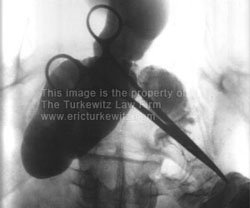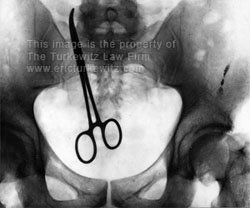 Are doctors ratcheting up the protectionism for those that commit medical malpractice, according to an article in USA Today. (Medical malpractice battle gets personal.) The article ledes with a story of a nurse who was fired from her job simply because her husband works at a firm that does medical malpractice litigation. [Update, the story is from 2004, not yesterday as originally posted, but the tension between the two camps of physicians described below still exists.)
Are doctors ratcheting up the protectionism for those that commit medical malpractice, according to an article in USA Today. (Medical malpractice battle gets personal.) The article ledes with a story of a nurse who was fired from her job simply because her husband works at a firm that does medical malpractice litigation. [Update, the story is from 2004, not yesterday as originally posted, but the tension between the two camps of physicians described below still exists.)
Apparently, some aren’t too thrilled that there are lawyers out there trying to hold medical personnel accountable if they commit negligence. It was almost a year ago that I wrote a piece about the White Coat of Silence, regarding a Massachusetts General Hospital and Harvard Medical School study that found 46% of doctors admitted they knew of a serious medical error that had been made but did not tell authorities about it.
According to the USA Today story:
Some doctors are refusing medical treatment to lawyers, their families and their employees except in emergencies, and the doctors are urging the American Medical Association to endorse that view. Professional medical societies are trying to silence their peers by discouraging doctors from testifying as expert witnesses on behalf of plaintiffs. And a New Jersey doctor who supported malpractice legislation that his colleagues opposed was ousted from his hospital post.
This is, of course, appalling conduct. And continuing to discourage investigations and bury the mistakes will ultimately lead to a medical system that is worse off.
Thankfully, this conduct is not universal, as others have taken a vastly different tactic: They apologize for mistakes. And the result of those apologies is that lawsuits have dropped. (See: How to Put Medical Malpractice Attorneys Out of Business on 5/22/08 and More Doctors Encouraged To Say “I’m Sorry” on 4/11/07).
How effective are apologies? According to a May 18, 2008 story in the New York Times (Doctors Say ‘I’m Sorry’ Before ‘See You in Court’):
At the University of Illinois, for example, of 37 cases where the hospital acknowledged a preventable error and apologized, only one patient filed suit. At the University of Michigan Health System, existing claims and lawsuits dropped from 262 in August 2001 to 83 in August 2007, and legal costs fell by two-thirds.
One particularly clueless surgeon quoted in today’s paper, Chris Hawk of Charleston, S.C., doesn’t seem to understand that basic human concept of the apology. Instead, he attacks the lawyers, as if this will stop malpractice from occurring. According to the article:
In South Carolina, Hawk says he first urged fellow doctors to refuse non-emergency treatment to lawyers, their families and employees in a speech at the state medical association’s convention in March.
With that attitude, one has to wonder what Hawk and his ilk would tell a patient if they realized that a medical problem was caused by another doctor. Would Hawk be able to fulfill his ethical obligation to be honest with his patient under those circumstances? Is this the type of physician that a patient would want to have? He might do well if he first tried to understand why patients call lawyers to begin with.
And so the internal battle that the physicians are having continues to rage on. On one side are the protectionists who seek government intervention to afford various immunities for acts of negligence. Personal responsibility is, apparently, not their mantra.
And on the other side are the far savvier, and human, physicians that have come to realize that cover-ups create a whole host of problems. These range from inaccurate medical records and therefore improper treatment, to protecting bad doctors despite the risks to future patients, to resentment by patients who feel they have not had the level of candor that they deserve. And they have come to realize the simple human gratefulness of a distressed patient that has simply been told the truth.
(hat tip to Carolyn Elefant)



